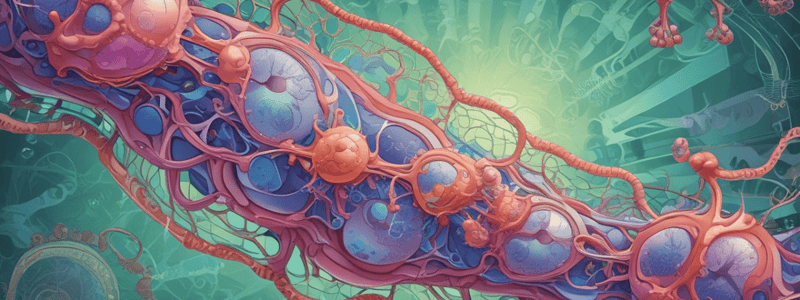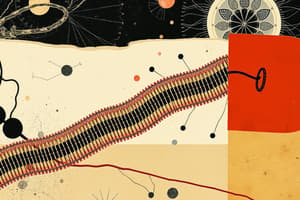Podcast
Questions and Answers
What is the study of interactions between organisms and their environment?
What is the study of interactions between organisms and their environment?
- Microbiology
- Botany
- Genetics
- Ecology (correct)
What is the process by which cells divide to produce four daughter cells, each with half the number of chromosomes as the parent cell?
What is the process by which cells divide to produce four daughter cells, each with half the number of chromosomes as the parent cell?
- Meiosis (correct)
- Mitosis
- Binary fission
- Genetic drift
What is the branch of biology that deals with the study of the structure, function, and behavior of molecules?
What is the branch of biology that deals with the study of the structure, function, and behavior of molecules?
- Genetics
- Biophysics
- Biochemistry (correct)
- Molecular Biology
What is the study of the inheritance of traits in organisms?
What is the study of the inheritance of traits in organisms?
What is the process by which cells respond to stimuli? change
What is the process by which cells respond to stimuli? change
What is the branch of biology that deals with the study of the structure and function of cells?
What is the branch of biology that deals with the study of the structure and function of cells?
Flashcards
Ecology Definition
Ecology Definition
The study of how organisms interact with their environment.
Meiosis Process
Meiosis Process
Cell division making 4 daughter cells with half the parent's chromosomes.
Biochemistry Study
Biochemistry Study
Study of molecules and how they work in living things.
Genetics Study
Genetics Study
Signup and view all the flashcards
Cell Response
Cell Response
Signup and view all the flashcards
Cell Biology Focus
Cell Biology Focus
Signup and view all the flashcards
Study Notes
Branches of Biology
- Botany: Study of plants
- Zoology: Study of animals
- Microbiology: Study of microorganisms
- Ecology: Study of interactions between organisms and their environment
- Genetics: Study of heredity and variation
- Biochemistry: Study of chemical processes in living organisms
- Biophysics: Study of physical principles underlying biological processes
- Molecular Biology: Study of biological molecules and their interactions
Cell Biology
- Cell structure: Plasma membrane, cytoplasm, nucleus, mitochondria, ribosomes, lysosomes
- Cell functions: Metabolism, growth, reproduction, response to stimuli, movement
- Cell division: Mitosis, meiosis, binary fission
- Cell signaling: Communication between cells through signals and responses
Evolution
- Theory of evolution: Descent with modification, natural selection, genetic drift, mutation, gene flow
- Evidence for evolution: Fossil record, comparative anatomy, molecular biology, biogeography
- Mechanisms of evolution: Speciation, adaptation, co-evolution
Genetics
- Mendelian genetics: Laws of inheritance, dominant and recessive alleles, Punnett squares
- Molecular genetics: DNA structure, replication, transcription, translation, gene expression
- Genetic variation: Mutations, genetic recombination, gene flow, genetic drift
Ecology
- Ecosystems: Communities of organisms and their environment, energy flow, nutrient cycling
- Population ecology: Population growth, population dynamics, demography
- Community ecology: Species interactions, predator-prey relationships, symbiosis
- Ecosystem services: Provisioning, regulating, cultural, supporting services
Human Biology
- Human body systems: Nervous, circulatory, respiratory, digestive, endocrine, immune
- Human development: Embryogenesis, growth, development, aging
- Human health: Disease, infection, immunity, nutrition, wellness
Studying That Suits You
Use AI to generate personalized quizzes and flashcards to suit your learning preferences.




